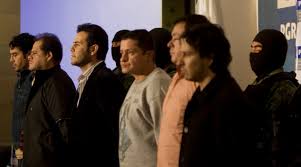U.S. Prosecutors Enter Plea Talks with Infamous Cartel Leader Ismael ‘El Mayo’ Zambada
On Wednesday, U.S. prosecutors revealed they are in talks about a possible plea agreement with Ismael “El Mayo” Zambada, the notorious Mexican drug kingpin who was captured last summer. His son may be called to testify against him if the case goes to trial.
Assistant U.S. Attorney Francisco Navarro recently stated that plea discussions with Ismael “El Mayo” Zambada, the notorious leader of Mexico’s Sinaloa cartel, have yet to yield a resolution. However, the prosecutors are keen to continue pursuing these discussions. A judge has scheduled a hearing for April 22 to review the status of these talks. Frank Perez, Zambada’s primary attorney, declined to provide any comments regarding the plea negotiations.
It is not uncommon for prosecutors and defense attorneys to explore possible plea deals, although such negotiations do not always lead to a resolution. During a recent court hearing, Zambada actively participated and voiced his concerns about his legal representation. The hearing centered around whether he wanted his attorney, Perez, to continue representing him, given that Perez also represents Zambada’s son, Vicente Zambada, who could potentially be a government witness in his father’s case. Despite the potential conflict of interest, Zambada expressed that he wanted Perez to remain as his attorney, even acknowledging that it could complicate matters if the defense attorney had to represent both father and son.

Vicente Zambada has his own legal troubles, having been charged in connection to the Sinaloa cartel’s activities. He has already entered into a plea agreement and provided testimony for the U.S. government during the trial of Joaquín “El Chapo” Guzmán, the cartel’s infamous co-founder, who is currently serving a life sentence in a U.S. prison. At Guzmán’s trial, Vicente revealed details about how his father and Guzmán jointly ran the cartel, including instances where corrupt Mexican politicians sought assistance from the cartel to transport massive amounts of cocaine. Additionally, Vicente recalled moments of cartel violence, including threats to his father’s life from a rival gang leader.
The possibility of Vicente testifying against his father in court has raised concerns of a conflict of interest for Perez. As Zambada’s attorney, Perez may find it difficult to cross-examine his own client’s son, given his professional obligations to both individuals. In such cases, defense lawyers often face ethical dilemmas, and federal courts have established procedures to address potential conflicts. This includes having an independent lawyer advise defendants on how to handle these situations. During the hearing, Zambada acknowledged that Perez’s dual role might lead to complications, particularly in situations where Perez would have to withhold information learned from Vicente.
In light of these concerns, U.S. District Judge Brian Cogan allowed Perez to continue representing Zambada, noting that the defendant also has other legal counsel who could take over any aspects of the case related to his son.
Zambada’s legal issues come after his dramatic arrest in July at an airport near El Paso, Texas. He was apprehended after arriving on a private plane alongside Joaquín Guzmán López, one of Guzmán’s sons, who was also a wanted figure in the U.S. Zambada later claimed that he was abducted in Mexico and brought to the U.S. against his will by Guzmán López, a claim that Guzmán López’s lawyer has denied.
The arrest triggered violent cartel clashes in Mexico, particularly between factions loyal to Zambada and those aligned with the “Chapitos,” Guzmán’s sons. These violent incidents led to political tensions between Mexico and the U.S. Mexico’s president at the time, Andrés Manuel López Obrador, and the current president, Claudia Sheinbaum, both suggested that the U.S. actions, particularly the arrests, contributed to the violence in Mexico.
In response, outgoing U.S. Ambassador to Mexico, Ken Salazar, called it “incomprehensible” to blame the U.S. for the cartel violence and stressed that Mexico’s failure to cooperate on addressing drug cartels and combatting police corruption was the root cause of the issues. The Mexican foreign ministry later expressed “surprise” at Salazar’s remarks, emphasizing their disagreement with the U.S. perspective.


Comments are closed, but trackbacks and pingbacks are open.